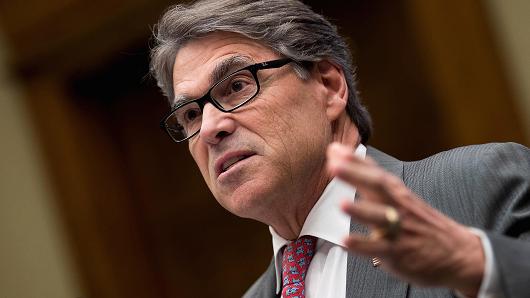
Getty Images
Secretary of Energy Rick Perry testifies during a House Energy and Commerce Committee hearing on Capitol Hill, October 12, 2017 in Washington, DC.
Federal regulators on Monday rejected a rule proposed by Energy Secretary Rick Perry that would have subsidized coal and nuclear power plants in some parts of the United States.
However, the Federal Energy Regulatory Commission kept the issue alive by ordering the organizations that operate regional grids and power markets to submit reports to the commission on grid resilience issues in their areas.
In a statement, FERC said “we appreciate the Secretary reinforcing the resilience of the bulk power system as an important issue that warrants further attention.”
The decision is a setback to President Donald Trump’s efforts to prop up ailing coal-fired plants and nuclear power stations, as well as the mining industry.
The proposal, known as the Proposed Rule on Grid Reliability and Resilience Pricing , was immediately controversial when the Department of Energy first revealed it in September. It would require the regional markets that set electricity prices to compensate power plants that keep 90 days of fuel supplies on site.
Coal and nuclear power plants typically fit that description.
Perry said the rule was necessary to keep the U.S. electric grid resilient during events such as the 2014 Polar Vortex, when disruptions to natural gas supplies during extreme cold contributed to power outages. Coal and nuclear power plants in danger of closing need to be kept online and deserved to be rewarded for the reliability they bring to the grid, he argued.
Perry also directed FERC to rule on the proposal on an expedited basis, citing concerns about the integrity of the grid. FERC is an independent government agency that regulates interstate transport of oil and natural gas and electric power transmission.
But opposition swelled among environmentalists, regional transmission organizations, and the oil, natural gas and renewable energy industries. They argued that power outages due to fuel disruptions are extremely rare and Perry’s rule would distort prices in competitive power markets, which were designed to lower costs.
They also said there was no reason to rush the process since the Energy Department and North American Electric Reliability Corporation have determined there is no imminent threat to the U.S. power grid.
 EU News Digest Latest News & Updates
EU News Digest Latest News & Updates



